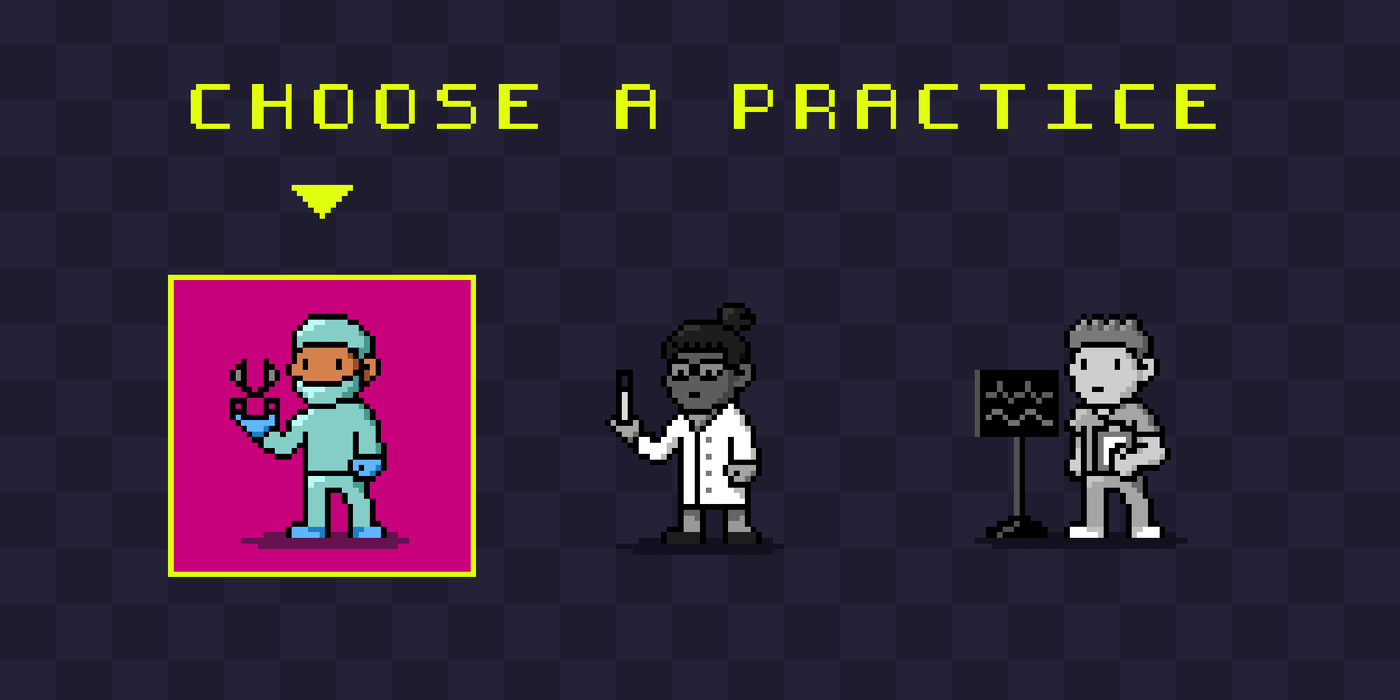“‘Have you tried it?’ — that’s the first thing I would ask skeptics of gaming in medicine,” said Eric Gantwerker, MD, a pediatric otolaryngologist in academic practice in New York and vice president, medical director at video game company Level Ex.
When it comes to medical video games, preconceived notions have for years contributed to wariness among health care professionals. Their minds often turn to low quality “edutainment” programs of the ‘80s, or more contemporary high-flying games with little, if any, medical relevance. Critics have also cited downsides such as additional costs, possible dissociation with patients, and the potential for addiction.
In more recent years, however, medical video game manufacturers have sought to deliver options with a high level of sophistication and clinical utility.
“The $90-billion video game industry has complexity, immersion, engagement — all the things we’ve been trying to achieve in medical training and education,” Dr. Gantwerker said. “As clinicians, we need to be more efficient with how we learn and teach and prepare for work, and video games offer a huge advantage to that end.”
Time to Change
The COVID-19 pandemic has altered the landscape of the health care industry, from everyday clinical practice to medical education and training. Hospitals have had to suspend elective procedures for extended periods of time; medical associations have had to seek out new approaches to continuing education; and medical programs have had to drum up creative ways to interview and teach incoming students and trainees, among other momentous changes.
These developments have made it challenging for some clinicians to maintain or improve upon their clinical skills, whether they are surgeons who perform intricate procedures or critical care physicians and NPs accustomed to making quick judgment calls.
“Skill degradation for clinicians is real,” Dr. Gantwerker said. “And the loss of learning among medical students and residents, whose education depends on experiential learning on the wards, is a tremendous problem. COVID-19 shone a bright light on this.”
Recent shifts in the landscape of medical care have motivated leaders to revamp the way clinicians train and educate the next generation of students, residents, and fellows, according to Atman Shah, MD, an interventional cardiologist and associate professor of medicine at the University of Chicago.
“In light of the pandemic — not being able to attend in-person conferences for CME or teach students in a traditional fashion — we realized that we’ve got to change,” he said. “We can’t keep doing what we’re doing.”
The sudden changes COVID-19 forced upon the medical community has renewed interest in adopting technological advancements. Its burgeoning acceptance has provided gaming proponents with an opportunity to demonstrate its value and help address concerns over clinical skill preservation and gaps in medical education.
“There are already incremental changes taking place,” Dr. Shah said. “We’re seeing videos, animations, and other gamified elements being integrated into CME; and a lot of it is web-based now.”
Readily available medical video games that allow physicians, for example, to practice their surgical skills or simulate scenarios to better understand outcomes in real time, appear to be rising in popularity. Clinicians can engage with such games from nearly any location on a variety of devices, from their cell phones to virtual and augmented reality headsets. Several medical institutions, including Stanford and Harvard, have relied on these gaming technologies for various aspects of medical education for nearly a decade.
Double-Edged Sword
Amid clinician hesitancy, early research exploring the potential benefits of gaming has made some headway over the past several years.
A preliminary JAMA Surgery study showed that a cohort of surgical residents and attendings with at least three hours per week of video game experience made 37% fewer errors and were 27% faster at completing a laparoscopic and suturing program, compared with surgeons who rarely or never played. Similar studies have pointed to modest advantages for performing endoscopy and robotic surgery, as well as enhanced dexterity with virtual laparoscopy and camera navigation.
Beyond skill-based simulations, educational and situational games have proved useful as well. In a 2012 study covering nearly 1,500 urologists, Harvard researchers found that an online medical education game substantially improved physicians’ knowledge of relevant specialty guidelines. A more current BMJ study found that an ED-centric video game improved the triage performance of emergency medicine physicians more than traditional didactic education.
“Video games are built precisely to keep you at the top of your abilities, or just beyond them — to keep you challenged at your regime of competence,” Dr. Gantwerker said. “That’s where video games blow everything else away in medical training and education, helping you maximize your learning and be most efficient.”
Yet medical video gaming’s reliance on digital technology may be an undesirable caveat for some clinicians, according to Peter Grinspoon, MD, a primary care physician at Massachusetts General Hospital and instructor in medicine at Harvard Medical School. It draws clinicians ever closer to computer screens and farther away from direct patient interactions, aggravating the tug-of-war dynamic between screen time and patient time.
“Physicians and clinicians in training spend way too much time on the computer already,” Dr. Grinspoon said. He highlighted a 2016 study that showed residents spend less than 10% of their time interacting with patients, the rest typing things into the computer.
“Technology is a double-edged sword,” he continued. “It helps us safely care for patients and train from home but keeps us apart from a society increasingly suffering from loneliness and isolation.”
For radiologists, who can spend upwards of 90% of their time reading images, engaging in medical video gaming may further reduce the limited amount of time they engage with colleagues and patients.
“A possible downside of gaming is that you might miss out on the personal touch — that’s the big thing,” Barry Julius, MD, associate program director of radiology at St. Barnabas Medical Center, said. “It’s really important to maintain some hands-on interactions with patients, because at some point, you’re going to have to be there for them.”
Better Clinicians
Still, Dr. Julius acknowledged that learning styles tend to vary widely. And when developed correctly — with experts in engineering, gaming, and medicine working in concert — video games have the potential to fill an educational gap and forward the needs of students and clinicians, he said.
“It'd be nice to see a video game that helps residents get to the next level and become better doctors,” he said. “We're looking for that first great one that will actually become a standard.”
What’s more, medical video games may be a welcome alternative to more traditional educational models because they are intrinsically entertaining. And as burnout-related issues become increasingly prevalent, video games may join the ranks of mindfulness training, yoga, and other strategies to help address them.
“Ultimately, games are fun,” Dr. Shah said. “We know we like playing them, and many of us have tried them as a healthy distraction. If it allows us to escape for a moment, to be engaged in work without the stress, that can make us become better people and better physicians.”
Disclosures: Dr. Eric Gantwerker is vice president, medical director at Level Ex, a technology company that creates video games for medical professionals, founder and CEO for educational technology consulting firm MedEd Innovations, and vice president of medical education at surgical video platform company GDT Innovations/CSurgeries. Dr. Atman Shah has served as a consultant for LevelEx and received payment for his services. Dr. Peter Grinspoon is a contributing editor to Harvard Health Publications. Dr. Barry Julius is a managing partner at Imaging Consultants of Essex and founder of radiology resident blog Rads Resident.
Animation by Diana Connolly






